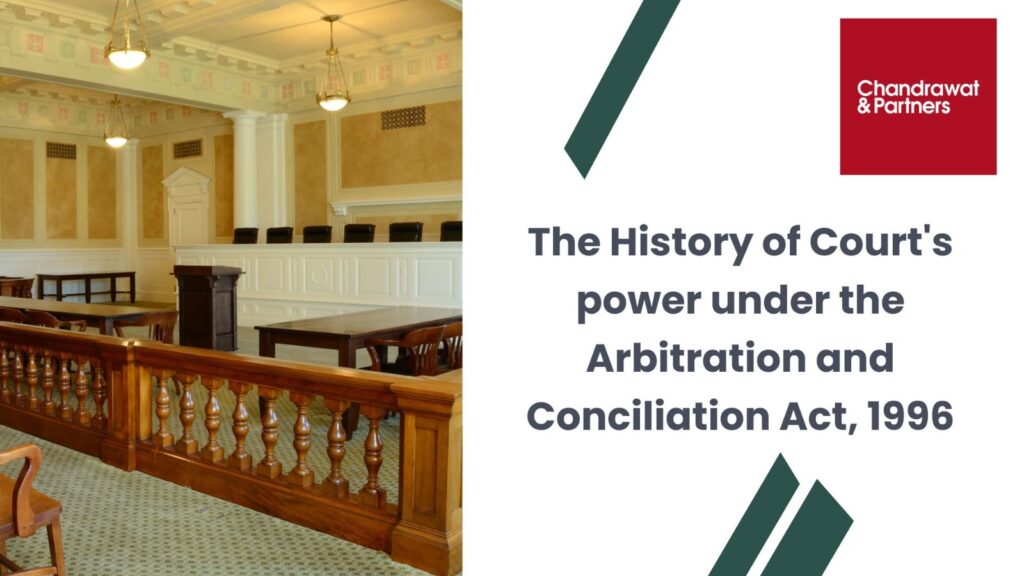History and Basic Powers of Civil Court
Historically arbitration process was part of the Greek judicial system and the world has taken inspiration from the same. King Solomon is regarded as the father of arbitration in the world and was also responsible for the first known arbitration in the world. In India, the arbitration process was part of the Indian judicial system for a long back but after the United Nations Commission On International Trade Law (“UNCITRAL”) model in 1985, India consolidated national and international arbitration laws and by the Arbitration and Conciliation Act 1996 which repealed earlier acts of 1961 Foreign Award Act, 1937 and 1940 Domestic Arbitration Act respectively.
The main purpose to bring 1996 Act was to ease the procedure of our judicial system in matters related to commercial transactions, family matters, etc. Herein the main role of the civil court was to appoint the arbitrator, interfere when required for the end of justice, enquire about the arbitrator, etc.
But after the case of Guru Nanak Foundation v. Ratan Singh in which it was said that the arbitration process is an intermingling, time-consuming, complex, and expensive court procedure that impelled jurists to search for an alternative forum. In the same case, it was pointed out that there is too much interference from courts in the functioning of arbitration tribunals. We have witnessed many case laws and amendments of 2019 after which such conditions are modified and simplified for better and practicable use.
Judiciary and legislature over the powers of civil court
There are several pronouncements of the Supreme Court on this issue but the major ones are as follows;
The first landmark comes in the year 2002 which is the Konkan Railway Corporation Limited v. Rani Construction PVT Limited. In this case and a contract was awarded by Konkan Railway Corporation Limited to Rani Construction Private Limited. After which a dispute arises between both the parties over the execution of the contract. This resulted in the termination of the contract by Konkan Railway.
Rani Construction took this case to the arbitration tribunal. Supreme Court in this case held that interference of the district courts should be minimum and should not be done in such a manner that contradicts the arbitration process rather the steps should be taken to support the arbitration process.
Which was followed by Bhatia International v bulk traders South Africa 2002, this case was responsible for a substantial impact on the powers of the court under the Arbitration and Conciliation Act 1996 in this case the supreme court conferred power to the civil courts to interview in international commercial arbitration seated in India even if the arbitration agreement provides for a foreign seat. This judgment was widely criticized by the Indian jurist and legal experts because this was going to negatively impact the objective of the arbitration act which is less interference of civil courts in the proceeding and faster justice.
This case was overruled by another landmark is of BALCO v Kaiser Aluminium Technology Services INC 2012 it was held that:
Part I of the Arbitration and Conciliation Act would not apply to foreign-seated arbitrations. The court clarified that Indian courts have no jurisdiction to intervene in foreign-seated arbitrations, and parties must approach the appropriate court at the seat of arbitration for any necessary relief.
In Swiss Timing Ltd. v. Commonwealth Games 2010 Organizing Committee (2014). In this case, it was held that the court’s duty to appoint an arbitrator is limited to the inquiry over the arbitrator itself and not to go into the merits of the case.
2019 Amendment
In 2019 substantial changes were made in section 11 of the Arbitration and Conciliation Act, firstly the power under the principle act conferred on the Chief Justice of the High Court concerning domestic arbitration and the Chief Justice of India concerning the international commercial arbitration for appointment of arbitrators. Secondly, if the parties have agreed to arbitration but have failed to make an appointment for whatever reason or disagreement, the parties could move to the court under Section 11 which gives default power of appointment in the hands of the judicial bodies. This is exercised by the High Court for domestic and Supreme Court for international matters. These amendments were responsible for taking all the powers from the hands of district civil courts and reducing the procedural implication from the arbitrator.
A Way Forward
The method of arbitration is rectified and implemented several times and in the words of Justice Indu Malhotra a lot of issues are left to be dealt with, and a lot of improvement is required in the Act. Just attempts by the legislators and judiciary are made to decrease the involvement of civil courts in the arbitration proceedings and to support the fast and efficient delivery of justice. The process of arbitration was to build interest in foreign countries to increase their investments in India and to ensure a speedy and efficient trial will be provided in case of any disputes.
For more information or queries, please email us at
[email protected]





